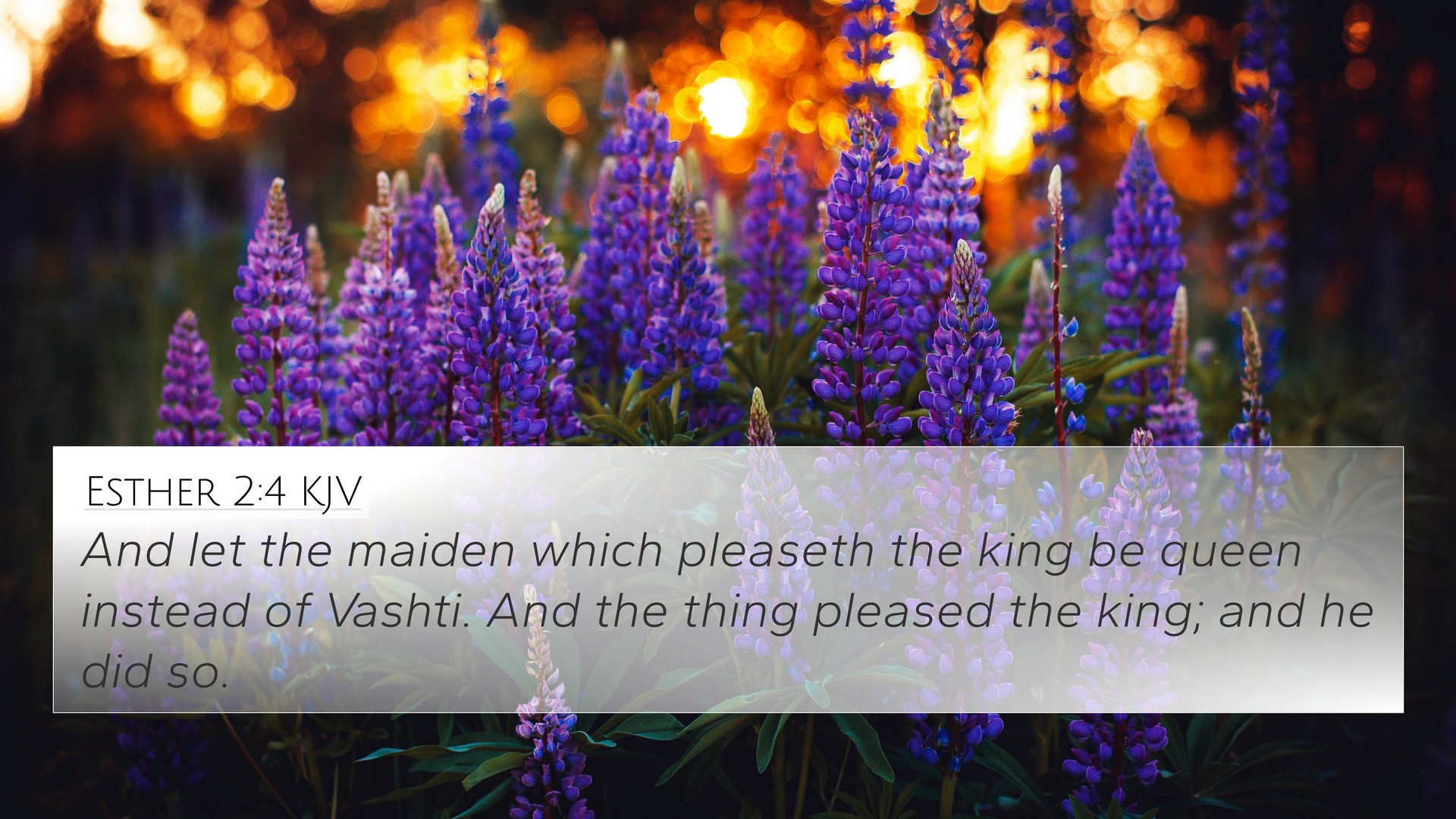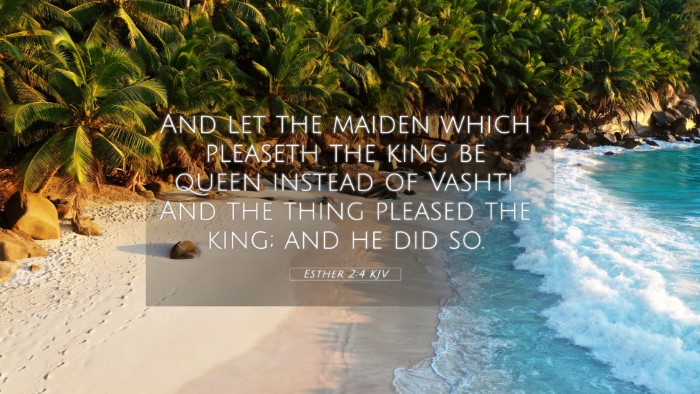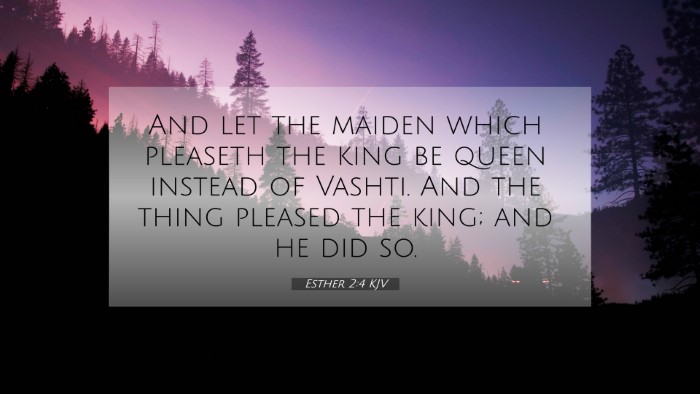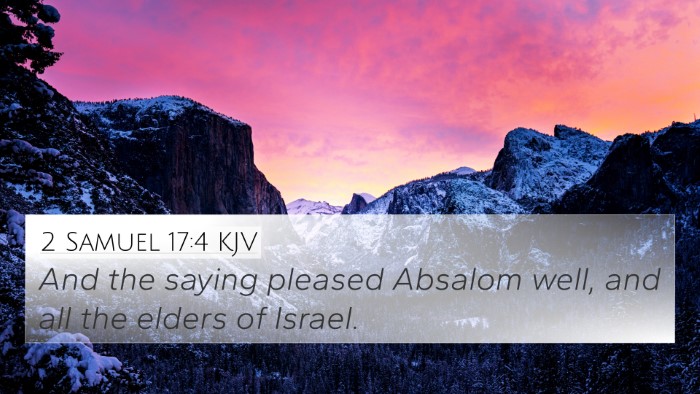Old Testament
Genesis Exodus Leviticus Numbers Deuteronomy Joshua Judges Ruth 1 Samuel 2 Samuel 1 Kings 2 Kings 1 Chronicles 2 Chronicles Ezra Nehemiah Esther Job Psalms Proverbs Ecclesiastes Song of Solomon Isaiah Jeremiah Lamentations Ezekiel Daniel Hosea Joel Amos Obadiah Jonah Micah Nahum Habakkuk Zephaniah Haggai Zechariah MalachiEsther 2:4 Similar Verses
Esther 2:4 Cross References
And let the maiden which pleaseth the king be queen instead of Vashti. And the thing pleased the king; and he did so.
Uncover the Rich Themes and Topics of This Bible Verse
Listed below are the Bible themes associated with Esther 2:4. We invite you to explore each theme to gain deeper insights into the Scriptures.
Esther 2:4 Cross Reference Verses
This section features a detailed cross-reference designed to enrich your understanding of the Scriptures. Below, you will find carefully selected verses that echo the themes and teachings related to Esther 2:4 KJV. Click on any image to explore detailed analyses of related Bible verses and uncover deeper theological insights.

2 Samuel 16:21 (KJV) »
And Ahithophel said unto Absalom, Go in unto thy father's concubines, which he hath left to keep the house; and all Israel shall hear that thou art abhorred of thy father: then shall the hands of all that are with thee be strong.
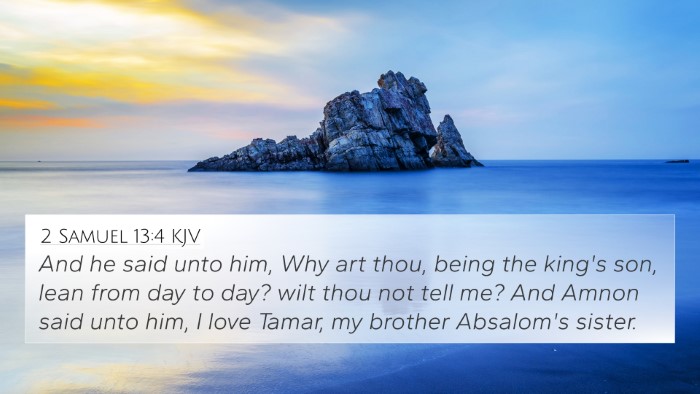
2 Samuel 13:4 (KJV) »
And he said unto him, Why art thou, being the king's son, lean from day to day? wilt thou not tell me? And Amnon said unto him, I love Tamar, my brother Absalom's sister.
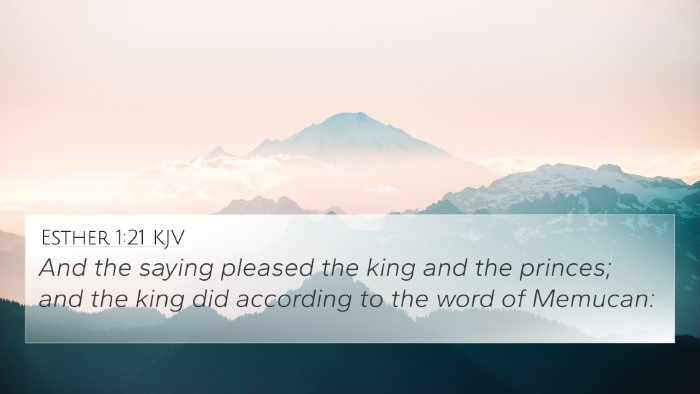
Esther 1:21 (KJV) »
And the saying pleased the king and the princes; and the king did according to the word of Memucan:
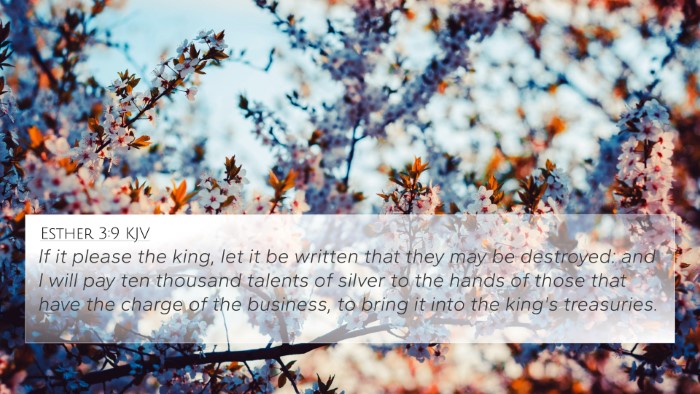
Esther 3:9 (KJV) »
If it please the king, let it be written that they may be destroyed: and I will pay ten thousand talents of silver to the hands of those that have the charge of the business, to bring it into the king's treasuries.

Matthew 14:6 (KJV) »
But when Herod's birthday was kept, the daughter of Herodias danced before them, and pleased Herod.

Matthew 20:16 (KJV) »
So the last shall be first, and the first last: for many be called, but few chosen.
Esther 2:4 Verse Analysis and Similar Verses
Understanding Esther 2:4
Esther 2:4 reads: "And let the maiden which pleaseth the king be queen instead of Vashti. And the thing pleased the king; and he did so."
Summary of Key Insights
This verse highlights the transition of power and the role of beauty and favor in the selection of a new queen. It underscores themes of divine providence and the unfolding of God's plan through human decisions.
Commentary Insights
Matthew Henry's Commentary:
Henry emphasizes the providential hand of God at work in the selections of leaders, as seen through the king's desire for a new queen. He suggests that God permits human choices while guiding events toward the fulfillment of divine purposes. The king's desire indicates a preference for qualities that may serve His larger narrative.
Albert Barnes' Commentary:
Barnes highlights the importance of the king's pleasure in determining who would replace Vashti. He reflects on the political implications of the decision, suggesting that the beauty of the maidens was a factor in capturing the king's attention to ensure stability within the kingdom. This choice reflects societal norms of the time regarding the qualifications for queenship.
Adam Clarke's Commentary:
Clarke delves into the social dynamics at play, suggesting that the king’s decree was not just a matter of preference but a need to restore order after Vashti's dismissal. He draws attention to the fact that God's ultimate purpose is often revealed through the seemingly trivial; thus, the selection of the queen is significant in God’s overarching plan for His people.
Bible Cross-References
- 1 Samuel 16:7: The Lord looks at the heart, emphasizing the internal qualities rather than mere outward beauty.
- Proverbs 31:30: Highlights the importance of a virtuous woman, contrasting physical beauty with inner virtue.
- Esther 1:19: Connects to the previous queen’s downfall, introducing the context for selecting a new queen.
- Genesis 12:11: Illustrates the appeal of beauty and the societal reactions it can provoke.
- Isaiah 40:6-8: Speaks to the transient nature of human beauty, suggesting deeper themes of God's eternal word.
- 1 Peter 3:3-4: Encourages women to find their value in godly character rather than outward adornment.
- Matthew 20:16: Reflects on the last being first, suggesting a reversal of societal norms, much like Esther’s rise to queenship.
- Ruth 2:10: Another narrative of favor, focusing on God's providence in relationships and divine favor through beauty and character.
- Hebrews 11:32-34: Mentions figures of faith who acted in moments of decision, linking the courage of Esther to the lineage of faithful believers.
- Galatians 4:4: Emphasizes the fullness of time in God's plans, connecting the importance of Esther’s position in the divine timeline.
Thematic Connections
This verse can be viewed through various thematic lenses, such as:
- Divine Providence: God's unseen hand in guiding human decisions.
- Leadership and Authority: The characteristics that define kingship and queenship in Biblical context.
- Beauty and Favor: The role of physical and inner beauty in God's plan through women in the Bible.
- Reversals of Fortune: How God uses unlikely circumstances and individuals for His purpose.
- Faith and Obedience: The need for believers to trust in God's unfolding narrative in their lives.
Conclusion
Esther 2:4 serves as a reminder of God's sovereignty and the unfolding narrative of His people, demanding investigation through cross-referencing Biblical texts to gain a fuller understanding of its implications.
